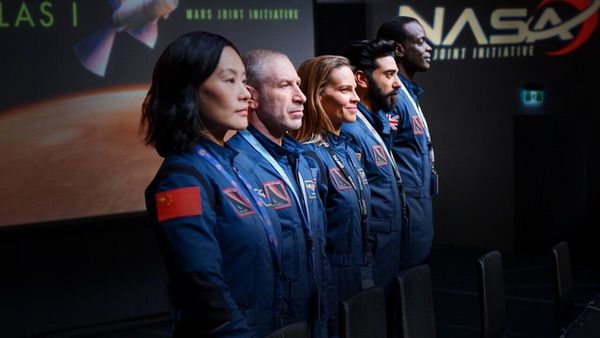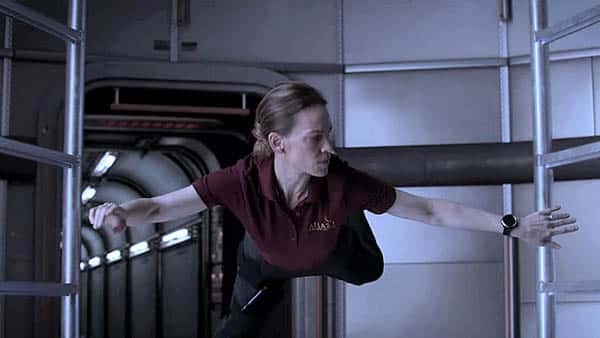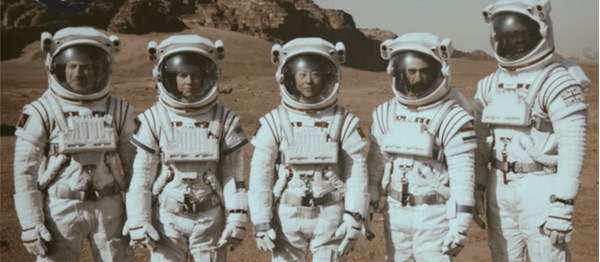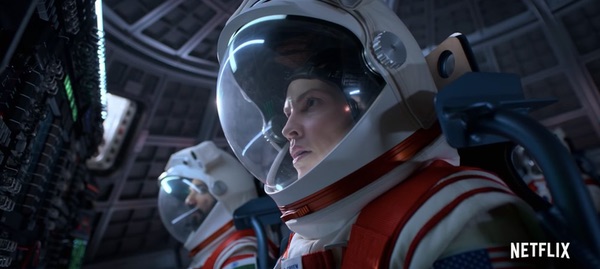Mars ain’t the kind of place to take your kid: Netflix’s “Away”by Dwayne A. Day
|
| “Away” is not an indication that Mars is back in the popular discussion, because “Away” isn’t really about Mars at all. |
Only a few months ago, several publications declared “the summer of Mars” due to the rapid launch of three robotic spacecraft to the red planet. But that was merely a blip, quickly forgotten in a hurricane of a year. Is Mars being discussed more now in 2020 than it was in 2019, or 2018? Although there is no good way to measure that, the answer is almost certainly no. A few years ago Mars was getting a lot more attention than today. In 2015, there was the wildly popular movie The Martian starring Matt Damon as resourceful and indefatigable Mark Watney. This was followed by a 2016 National Geographic TV show named “Mars.” There was the mopey teen romance The Space Between Us that was supposed to debut in 2016 but got pushed back several times to 2017 (and forgotten). (See: “Love and a Red Planet: popular entertainment and the settlement of Mars (part 1),” The Space Review, November 28, 2016; “Red Planet blues: popular entertainment and the settlement of Mars (part 2),” December 5, 2016; “Mars: Bringer of ennui (part 1),” The Space Review, January 21, 2019 and “Mars: Bringer of ennui (part 2)”, January 28, 2019). In 2018, Hulu debuted its series “The First,” produced by and starring Sean Penn, about an astronaut going to Mars. It got canceled soon thereafter.
That was just popular entertainment. We also had Elon Musk talking about his Mars settlement dreams and appearing on various news programs and all over the Internet. But generating even more popular publicity was the group Mars One, which not only announced plans to settle Mars, but even began the very public process of selecting its initial group of settlers (See: “Red Planet rumble,” The Space Review, August 17, 2015.) The Mars One story even got parodied by “The Simpsons” in a March 2016 episode about a privately run Mars mission. When the launch date is suddenly moved up, one participant quits, announcing “I wanted to be someone who’s bravely going to Mars eventually.” By the end of the episode, it turns out that the whole Mars thing is a sham. Maybe art was imitating life, but Mars One bravely stuck around a few more years until early 2019 when the public corporation Mars One Ventures AG declared bankruptcy. Mars One’s leaders claimed that their non-profit organization was still active, but considering that it depended upon money generated by the now-bankrupt for-profit corporation, it was no surprise that it too became very silent. Five years ago, Mars One was everywhere, now nobody talks about it at all.
All of this exhausting backstory leads us to the new ten-episode Netflix series, “Away,” about a mission to Mars. “Away” is not an indication that Mars is back in the popular discussion, because “Away” isn’t really about Mars at all. “Away” is primarily about how hard it is for people in space to leave their loved ones behind, but this theme is so overwhelming and so poorly done that it inadvertently stumbles on to one of the perplexing dilemmas of human spaceflight: why, if it’s so difficult, should anybody do it at all?
 The crew of the Atlas I consists of a stoic Chinese taikonaut, a gruff Russian cosmonaut, a happy-go-lucky Indian pilot, a spiritual Ghanian biologist, and commander Emma Green, who is distrusted by many of her crewmates. |
A Lifetime Movie in space
Emma Green, played by Hillary Swank, is an astronaut about to command the first mission to Mars, known as Atlas I. Her husband is a grounded astronaut with a genetic condition that prevents him from flying and is now the chief engineer for the program. Green is going to Mars with Russian cosmonaut Misha, Chinese taikonaut Lu, Ghanaian botanist Kwesi, and her Indian co-pilot and ship’s doctor, Ram.
Netflix has earned a reputation for funding quantity over quality, to the point where it became a joke that Netflix execs would buy any story idea pitched to them. We have had so many movies and television shows with Mars in the premise that it almost seems as if the pitch for this one was that Mars is irrelevant to the plot. “Away” is essentially an extended Lifetime Movie in space. It has many of the standard elements: wife and mom with a devoted husband and loving daughter; suburban family drama (husband gets ill, daughter starts doing poorly at school and dating a bad boy with a motorcycle); butting heads with colleagues at work until they finally begin to respect her. And like most Lifetime movies, everything is filmed in Canada.
Despite the show’s depiction of a lunar base and a Mars mission, everything that takes place on Earth is contemporary. The cars look the same, the phones look the same; there is nothing to indicate that this is the future. Remove its space setting and the basic story could have just as easily been set at an advertising agency in suburban Seattle (and still filmed in Vancouver.) You can imagine the Netflix pitch meeting: “It’s a spaceflight show about Mars that isn’t about spaceflight or Mars.” Netflix executive: “Sold! Here’s a pile of money! Go make it!”
| “Away” is essentially an extended Lifetime Movie in space. |
Like other shows on Lifetime or Hallmark, everybody lives in homes with perfect interior decorating and no clutter; no muddy shoes in the hallway, backpacks tossed on a couch, dirty dishes in the sink, or wet towels on the bathroom floor. Green’s daughter, Alexis, has no unique characteristics. She plays soccer because the writers couldn’t come up with any other characteristic or hobby for a teenage girl than soccer. And although the family supposedly lives in Houston, there’s no escaping the Canadian look to the exteriors: the overcast skies, persistent drizzle, bland architecture, and the visible breath coming out of everybody’s mouth when they’re outdoors. Houston is normally hot and humid, but we never see anybody sweat, or the horizontal rain, refinery fires, or endless car dealerships and strip clubs along I-45 that give Houston its charm. To their credit, the filmmakers kept Vancouver’s mountains out of the backgrounds.
It’s dismaying how predictable the series is. You know the writers don’t have a lot of ideas when a character early on speaks the exhausted clichéd line, “We have a situation.” The major plot points are visible a billion miles away. In the first episode, we learn that Emma is distrusted by Misha and Lu and any viewer paying attention knows that the next few episodes will involve her using her leadership abilities to win over their confidence. Even before the end of the first episode I could predict the arc of the first half of the series (not to mention the final episode): the second episode would focus on Misha and we’d learn about his personality through flashbacks and see Green do something to earn his trust; the third episode would do the same with Lu; and the fourth would probably involve telling us more about the Indian character’s background. Realizing that they were being predictable, the writers backed off on the drama in the fifth episode, before telling us Kwesi’s backstory in the sixth episode. The show telegraphs so many plot points that you could even make it into a game: stop an episode at the ten-minute mark and write down three things that you think will happen by the end; half a point if they happen in a later episode instead. Example: Alexis rides a motorcycle. Prediction: she will get in a motorcycle accident. Another example: the plant is mysteriously alive. Prediction: someone (guess) is giving it their water ration.
Like those liquid scrambled eggs that you can pour out of a bottle straight into a pan, this is TV storytelling formula pasteurized and homogenized and processed. We’ve seen many of these tricks for decades, like using character flashbacks to explain the story, but it was brilliantly perfected in the 2000s by the writers of “Lost,” and badly copied since then. Once you know the formula, you can also predict the overall series arc: after Green gains the trust of her crew by mid-season, they will be faced with some life-threatening accident forcing them all to work together to survive and begin to consider each other family. Meanwhile, back at home, something big will happen with Matt and Alexis, and Emma will not be able to help.
For most Mars-themed entertainment, the adventure begins on the Red Planet. “Away” spends ten episodes almost entirely in space. There’s no actual Mars in this Mars drama (well, almost, but I’ll get to that later.) There is also no explanation as to why Mars is even part of the story. That’s true not only for the mission—why did the international partners fund it?—but the crewmembers’ personal stories. Why is Green going to Mars if she seems so focused on her family at home? What’s her motivation? Where’s her drive and obsession with exploring a new world? As soon as she leaves Earth she wants to go back, and has teary-eyed video calls with her husband and daughter.
It is apparent that “Away’s” writers were aware of one of the fundamental aspects of being an astronaut—that they are more focused on their job than their families—and chose to flip that upside down. Real-life astronaut Scott Kelly admitted after returning to Earth from his nearly year-long stay in space that his family suffered. We’re told in passing that Green was a Navy pilot, and yet there are no indications that she endured any of the long deployments away from her family that Navy life requires. Green is far away from her family, and yet stays connected to them via teary conversations on her cellphone, which experiences no time lag until they’re almost at Mars and it becomes necessary for the plot, as if they suddenly go in a tunnel. I can’t get a T-Mobile signal at the Orlando airport, but Emma has great coverage all the way to Mars. Her conversations with her family are so ubiquitous that I hallucinated Neil Armstrong on the Moon: “That’s one small step for a… oh, wait, I have to take this call…”
 “Away” is a lot like a Lifetime Movie in Space. While traveling to Mars, Emma is constantly talking to her sick husband and her troubled daughter, while dealing with coworkers who don’t respect her. |
Boldly going… why?
It’s impossible to write about a space show like this and not compare it to other space shows set in essentially the present day. The obvious current comparison is to Apple TV+’s excellent “For All Mankind” (see: “Wasn’t the future wonderful?” The Space Review, March 9, 2020). That show also had its personal dramas, but the larger geopolitical backdrop of the Cold War was its main driver, the reason why everybody was doing what they did—simply put, it was about beating the Russians. Much of the drama was about the astronauts striving to be better at their jobs, usually at the expense of their families, sometimes tragically so. Although “For All Mankind” has many interesting things to say, one of its clear messages was that taking on bold challenges has clear and unavoidable costs.
| “Mars” was set on Mars, whereas “Away’s” ten episodes are set during the journey to Mars. They only land in the last few minutes of the finale. |
The other recent, and more appropriate, comparison is National Geographic’s “Mars,” which had two seasons, starting in 2016 (see: “Red zeitgeist: popular entertainment and the settlement of Mars (part 3),” The Space Review, January 16, 2017). That show had its personal dramas, but most of them were connected to the mission the people were performing. They were committed to their mission, they were all there to explore Mars, and that hostile planet fought them as they tried. The show had many flaws, but the premise of an alien environment and mechanical failures being the biggest challenges to the characters was spot-on.
But there’s also a big difference: “Mars” was set on Mars, whereas “Away’s” ten episodes are set during the journey to Mars. They only land in the last few minutes of the finale. “Away” is more reminiscent of a short-lived 2009 ABC show, “Defying Gravity.” (see: “Lost Lust in Space”, The Space Review, August 10, 2009; “We watch so you don’t have to,” The Space Review, September 8, 2009; “Losing gravity,” The Space Review, November 9, 2009; “Beating a dead space horse (yeah, Defying Gravity, again…)” The Space Review, February 8, 2010; “Going somewhere Out There: revisiting Defying Gravity one last time,” The Space Review, December 20, 2010). “Defying Gravity” had seven astronauts exploring the solar system, each with some kind of psychological trauma in their past. For the first several episodes the characters were depicted as horny and dimwitted, almost on the verge of wrecking their own mission. But lurking in the background was a bigger mystery: objects of extraterrestrial origin that had been seeded throughout the solar system and that the crew was assigned to collect. There was a very clear reason why that crew was in space and it justified their sacrifices. The producers apparently assumed that they needed the relationship drama to lure in their audience before they could introduce the sci-fi drama, although the show was canceled before it could get deep into the mystery. Although “Defying Gravity” was not great television, it at least had ambitions of being about something, exploring larger ideas of transformation and evolution.
 “Away” is filled with many scenes of actors hanging uncomfortably on wires, something that the filmmakers could have easily avoided. |
Things fall apart
If a show has great writing, acting, characterization, and visuals, you don’t bother to notice its technical flaws—those other things will carry you past them. But “Away” doesn’t have any of these things, so the technical issues do become apparent. Many near-term science fiction shows often pay only cursory attention to getting the science and technology right. “Away” exhibits interesting, insightful, and sometimes very clever technical ideas that are undercut by technical flubs that could have been avoided. At the beginning of the series the writers probably sat down with some technical advisors who brainstormed a lot of great ideas and made some good suggestions: show the astronauts pre-breathing before a spacewalk, have them fuel their spaceship at the Moon, put water in the walls to shield from radiation, create artificial gravity by rotating part of the ship, have the primary threat be the failure of the spaceship’s systems. After dutifully incorporating all these ideas into the show, the technical advisors were apparently sent home and never saw how badly their ideas were implemented.
It is an old cliché of Mars movies that something has to go wrong to put the crew in peril. In 2000, the movie Mission to Mars used the laughably retro plot device of a meteorite striking the spacecraft as it neared Mars, forcing the astronauts to jump (yes, jump) to a cargo ship in Mars orbit, an idea that might have been taken from an episode of the 1950s show “Tom Corbett: Space Cadet” (see: “Planet Hollywood, part 1 – Mission to Mars,” The Space Review, September 21, 2009). Red Planet, which came out the same year, had a solar flare damage the Mars ship, forcing the crew to abandon it (see: “Planet Hollywood, part 2 – Red Planet,” The Space Review, September 28, 2009). “Away’s” writers fortunately skipped those natural hazards in favor of a far more likely scenario: mechanical failure. Things break. Then more things break. Fixing them does not always go right. Spaceflight, it turns out, is hard.
| If “Away” was superior in other respects, these technical plot holes would not matter—except that there are an awful lot of them. And if you’re going to write in technical plot points, why not use good ones? |
But often when a clever or at least accurate technical idea is introduced, it is soon undercut by something that is nonsensical, if not outright dumb. We learn that the Atlas I is going to refuel at the Moon. Using lunar volatiles to power a Mars mission has never really made much sense, but it is at least being currently discussed among space planners. But then we learn that Atlas landed on the Moon and will take off from there as well, and if you consider all the fuel that it used going into and out of the Moon’s gravity well, this seems rather pointless. Similarly, the Atlas I spacecraft has a rotating section to create gravity, and the astronauts have their sleeping quarters located there. Yet rather weirdly, their galley is in the zero-g section of the ship, meaning that eating food would be rather difficult. This also forced a bad directorial decision to have the actors awkwardly hanging on wires to simulate zero-g, which undoubtedly made “Away” a very uncomfortable shoot for them. For the viewer, it just looks like bad wire work, almost a “Saturday Night Live” parody of people floating in space.
There are many other examples in “Away” where a good idea is followed by a plot hole, sometimes literally. After the water reclamation system fails completely, the crew decides to drill into the wall of their spacecraft to siphon out the water it contains for radiation shielding. But despite the danger of puncturing the hull and losing atmosphere, nobody is standing by with an emergency patch to plug any hole. One is also left wondering why there was no access valve on the inside of the ship.
Late in the mission, the Pegasus cargo spacecraft, which is only a few weeks ahead of Atlas I, disappears and is presumed lost. Why wasn’t it launched and landed on Mars before Atlas I ever took off? Plot reasons. Back in Mission Control, Matt proposes sending Atlas around Mars to head back to Earth and rendezvous with a second cargo ship heading to Mars. A character points out that the two ships would be hurtling toward each other at extremely high velocity, making rendezvous impossible, making Matt look like a chief engineer who does not understand orbital trajectories. Eventually this option is abandoned, but not because it is quite clearly impossible.
Again, if “Away” was superior in other respects, these technical plot holes would not matter—except that there are an awful lot of them. And if you’re going to write in technical plot points, why not use good ones? Despite this, there was one technical solution that I thought was clever, although a bit contrived. Lu comes up with the idea of using the old InSight lander’s seismometer to detect the cargo ship’s sonic boom, which would indicate if it entered Mars’ atmosphere, broke up, or missed the planet entirely. The idea of using an old spacecraft on Mars to help out astronauts in peril is not new (Val Kilmer did it in Red Planet, and Matt Damon did it in The Martian), but it’s still a neat idea.
 Yep, saw this coming. |
Characters with no sharp edges
“Away” has no bold goal or mystery driving the plot, and no larger ambitions beyond a mediocre relationship drama. However, it does have a mystery that drags on the show like an anchor—how did somebody as incompetent and uninspiring as Emma Green end up commanding the mission? This is most evident in the early episodes, when Misha and Lu are practically in open revolt to Green’s command. Surprisingly, they don’t want to replace Green themselves. Their opposition to her is not nationalistic, but personal, even professional. They would prefer another American astronaut, a male astronaut they trained with, command the mission.
There is a feeble explanation as to why the crew does not get along all that well at first: they were selected by their governments because they were good at their jobs, not because they had good interpersonal skills as a team. The Chinese government (as represented by the Chinese space agency) is portrayed as particularly coldly calculating. At one point the Chinese space agency representative rejects a plan to save the crew by returning them to Earth, bluntly declaring that China would rather have a dead hero on Mars than a live coward on Earth. But it takes a lot of suspension of disbelief to accept that they have trained for two years together, but the conflicts only emerge when they take off.
Although Emma wins over the trust of her crew in the first few episodes, she manages to blow it again later in the series by making more bad decisions. One of the show’s many failures is that there is never a clear reason for the audience to believe she is command material. On the few occasions when she makes the tough calls, she is more likely to be wrong than right. Why would anybody follow somebody with such bad judgement?
| “Away” is melodrama, with the emphasis on mellow. |
The episodic flashbacks persist throughout much of the series, as does the personal drama back on Earth involving Matt and Alexis. Melissa, the former astronaut assigned to support Emma’s family, turns out to have a bit of a crush on Matt who is oblivious, although the audience can spot this long in advance. But Matt is so dull and uninteresting that the audience is unlikely to care about his inactive love life other than to wonder why Melissa is smitten with him. Alexis’ bad boy boyfriend turns out to be not so bad, although also not terribly bright either.
Matt, played by actor Josh Charles, spends almost the entire series in a wheelchair after being partially paralyzed by a stroke brought on by his genetic condition. The actor seems to have assumed that it wasn’t only his legs that are disabled but his emotions as well. He is placid and affectless for most of his scenes. Admittedly, none of the other actors’ performances stand out either. Hillary Swank’s two Oscars are long in her past and even though lightning struck twice for her, she has not had notable movies, roles, or performances since then. She brings no lightning here. But nobody else in the show demonstrates much charisma or chemistry; they just read their lines.
Some of the fault can be laid at the feet of the writers, who frequently pull their punches. Despite a few expletives in a later episode, “Away” could air in the middle of the day on a cable TV network that’s not trying to offend middle American values. For instance, Lu is shown falling in love with one of her Chinese coworkers during training, but their relationship is portrayed as strictly platonic, they never even kiss, and the word “lesbian” is never spoken, as if the producers feared that this would drive away a segment of their audience. Nobody was taking any risks here. “Away” is melodrama, with the emphasis on mellow.
In contrast to the far superior “For All Mankind,” “Away” is neither surprising nor original. Key plot developments are still being telegraphed even in the last episode. For instance, we’re repeatedly told that China’s agreement to participate in the mission (presumably paying the Americans) requires that Lu be the first person to set foot on Mars and to speak to Earth. This is mentioned several times in the final episode. But it is also apparent that Lu resents how her government has treated her. When another character tells her that governments don’t matter, only the people you love matter, it’s obvious what will happen at the end—so obvious, that I predicted the outcome halfway through the first episode.
Similarly, the show’s final episode sets up a few plot threads that will probably be explored in a second season, if there is one. But does anybody care if Matt gets involved with Melissa? Is the audience so invested in Emma and Ram that they want to see them become attached? Will Matt walk again? Is Alexis going to end up pregnant from her new boyfriend? If you like Lifetime movies, maybe these kinds of things are important to you, but anybody who starts watching “Away” because the premise is “Mars” is not going to care—they want Mars drama, not melodrama back in a cold and damp Houston.
Meekly going nowhere
One obvious conclusion about “Away” is that the producers and writers concluded that Mars itself is too uninteresting to drive their story. Whereas thousands of people around the world are fascinated with exploring the Red Planet and the challenges and promise it presents, that never enters the story here. This is not a show about exploring strange new worlds or establishing a foothold beyond Earth. It’s a show about a woman who really just wants to stay on Earth and be a wife and mother, not the commander of a bold and dangerous expedition.
| For “Away,” the destination is never really Mars, it’s the family. By the end of the series, the audience is left wishing that Emma had stayed back on Earth and someone else was up there instead. |
“Away’s” ten episodes never convincingly answer why Emma is in command, considering her lack of competence, knowledge, or commitment to the mission. We’re never shown, or even told, why she wants to go to Mars. That is true for most of the other characters as well. Kwesi, the botanist, is the sole exception. He wants to grow things on Mars, and eventually confesses that he wanted to plant a garden on Mars to show that if humanity could bring a dead planet to life, there was still hope for Earth. It’s a touching sentiment, and the only clearly defined motivation for any of them.
For “Away,” the destination is never really Mars, it’s the family. By the end of the series, the audience is left wishing that Emma had stayed back on Earth and someone else was up there instead, someone resourceful, knowledgeable, totally dedicated to the mission, and who would never even think about giving up.
Does Mark Watney have a sister?
Note: we are temporarily moderating all comments submitted to deal with a surge in spam.
